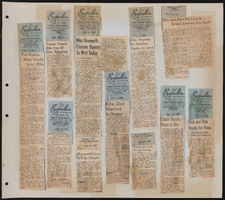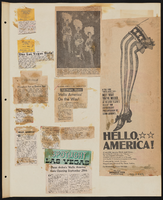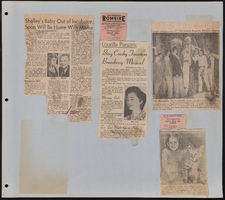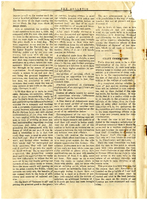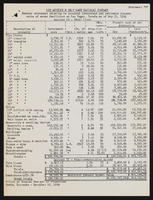Search the Special Collections and Archives Portal
Search Results

Transcript of interview with Santo Savino by Lisa Gioia-Acres, September 23, 2008
Date
Archival Collection
Description
Santo was born in the Bronx, New York in 1937. Santo’s family includes his father who was a butcher, and his mother who mostly stayed at home to raise the children, as well as a brother who currently lives with Santo. Santo recalls that it was great growing up in the Bronx, and he spent most of his life there until he joined the Air Force when he was 17. Santo’s immediate family was not musically oriented, but he learned to play the drums from a cousin. Music came easy for Santo, and he started getting paid for playing when he was 12. At 17, Santo joined the Air Force with a group of friends. He auditioned for and was accepted into the Air Force band where he played drums for four years. Santo was married with a child and another child on the way when he ended his military career and moved to California. After jobs working as a security guard and on an assembly line, Santo knew he just wanted to play and came to Las Vegas in 1960 to play with a band. It took several years before Santo was able to get on with a permanent band. Once Santo broke into the scene in Las Vegas, he played for six years at the Flamingo. Following that he was on the road for a couple of years with Paul Anka. Upon returning to Las Vegas, Santo worked for 14 years at the Sahara. Santo talks about when “the boys” had the hotels before the corporations came in and how everything changed. Currently, Santo does a lot of work with trumpet player Carl Saunders, frequently traveling to Los Angeles to do recordings together.
Text
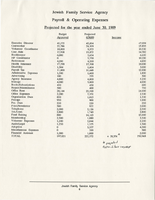
Orientation manual of the Jewish Family Service Agency of Clark County, 1989
Date
Archival Collection
Description
The orientation manual of the Jewish Family Service Agency provides guidance for the duties of the board of directors, the operation of the agency, the organization chart, and staff listing. It also outlines the role of volunteers in the agency.
Text

José Luis Gutiérrez oral history interview: transcript
Date
Archival Collection
Description
Oral history interview with José Luis Gutiérrez conducted by Maribel Estrada Calderón and Barbara Tabach on October 1, 2018 for the Latinx Voices of Southern Nevada Oral History Project. Also present during this interview is José's close friend Sergio Salgado, who was interviewed separately for the Latinx Voices project in 2018. José discusses his early life growing up in Guadalajara, Jalisco, Mexico, and his migration to Tijuana and then Santa Barbara, California as a teenager. He talks about his restaurant employment history both in California and in Las Vegas, including his time working at the Jolly Parrot, the Dunes Hotel and Casino, and his own eatery: Tortilleria Los Arcos. Subjects discussed include: Tortilleria Los Arcos; Club Social Mexicano.
Text

James Dean Leavitt oral history interviews: transcript
Date
Archival Collection
Description
Oral history interviews with James Dean Leavitt conducted by Claytee D. White on September 27 and October 4, 2022 for the Boyer Early Las Vegas Oral History Project. In this interview, Leavitt recalls his role in establishing a medical school at the University of Nevada, Las Vegas (UNLV), now known as Kirk Kerkorian School of Medicine. Leavitt was elected to the Board of Regents in 2004 while Jim Rogers was interim Chancellor of the Nevada System of Higher Education (NSHE), and he suggested the creation of an ad hoc committee Health Science Center Committee. In 2009, Leavitt became Chairman of the Board of Regents, Dan Klaich became Chancellor, and in the following year, Dr. Mark Doubrava joined the board. In May 2014, the planning dean was hired, Dr. Barbara Atkinson, and the UNLV School of Medicine was officially established on August 22, 2014.
Text

Transcript of interview with Renee Diamond by Barbara Tabach, November 20, 2014
Date
Archival Collection
Description
In this interview, Renee Diamond discusses coming to Las Vegas via Los Angeles, with her husband and children in the 1970s and getting involved in politics. She talks about her husband, Leo, and his business selling vinyl records in L.A., and her work in a doctor's office. Once in Las Vegas, the Diamonds joined Temple Beth Sholom and later Congregation Ner Tamid. Renee talks about her involvement in the political arena in southern Nevada, including the League of Women Voters.
Community activism and social justice rank high in the legacy of Renee Diamond. She often refers to herself as one of the last of the generation without college degrees that could make a difference in the politics of the state. When Renee, her husband Leo Diamond moved their family to Las Vegas from southern California, the energetic advocate Renee quickly plugged into the community. The word "No" was not part of her vocabulary. Among the many Jewish and secular activities the she engaged in were: the editorial board of the Jewish Reporter newspaper; Hadassah; Anti-Defamation League; Red Cross Board; State Museum Board to name a few. She remains a vibrant Democratic Party leader and served one term on the Nevada Assembly in 1989. She was on the front lines as a fierce and active supporter of Welfare Rights, Fair Housing and the Equal Rights Amendment. It is a life that included working alongside illustrious women and men of Southern Nevada history. A list that includes: Harriet Trudell, Ruby Duncan, Myrna Williams and Dorothy Eisenberg and many more mentioned here. Meanwhile she raised four children and enjoyed a loving 43-year marriage with Leo (aka "Uncle Leo") whose career included the popular Bingo Palace, Slots-A-Fun and Stations Casinos. During this oral history interview she recalls the Las Vegas that she moved to in 1972 and reflects on what attracted people here, ways to be part of the Jewish life which might even include a bowling league and how involvement in raising social awareness was a worthy investment of ones' time. This is a look at a woman who made a difference.
Text

